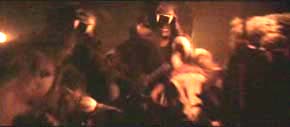 Wendols Wendols
The Wendols - a mysterios tribe of corpse-eaters
- is for many the "weakest spot" of the plot. I don't share this
opinion and below I am trying to prove that the wendols are not
that impossible and go perfectly well with the rest of the film.
Firstly, it is widely known that the Laplanders,
nearly at the same stage of development as wendols, lived in the
neibourhood of the Scandinavians in the early Middle Ages. Secondly,
the first European settlers in Britain met the ancient residents
of the island. Thirdly, even nowadays primitive tribes still exist.
As for the Wendols' horrible ceremonies, we nowadays would regard
all ancient peoples' customs and beliefs without exception as
cruel and bloody. The fact that this subject is widely exploited
by some filmmakers does not mean that there could not have been
a cannibalistic tribe living in Europe in the early Middle Ages.
Even in our computer age ritual head-hunting expeditions are organised
in some parts of the world, not to mention what was going on 1000
years ago.
On the whole, nobody can be
absolutely sure that many hundreds of years ago a story like the
one in the film or similar to it did not take the form of a legend
on which later Beowulf was based.
However that may be, the tribe of wendols
is another example of fine knowledge of ancient man's mentality
the filmmakers have and in this respect the wendols are absolutely
realistic. This is a matriarchal neolithic tribe whose Mother is
the chief religion-keeper and therefore seems to have absolute power.
These people have not yet come to regard warfare as a way of making
a living or "extended politics". They kill not in order to get treasures
or to win their place under the sun, but to win favour of supernatural
powers which control their life in this world.
That is why the riders are wearing bearskin
- the animal they considered to be their forefather (they dressed
differently in everyday life) they are taking part in a ceremony.
For this reason, they retreat at the moment they are just about
to win the battle: they should get back to their lair before the
dawn, because the ritual must take place in the dark. There is
a similar episode in Beowulf, but the Germans, on the contrary,
did not fight during the night. While they waited, another group
came to the aid of the trapped warriors and next morning saw the
defeat of yesterday's winners.. As for the wendols, the fact that
they attack at night is a clear indication for their rivals (and
for us) that they serve the dark forces.
The Nordic people, by contrast, represent
the transition period of gradually abandoning magic. On the one
hand, they are not unlike the wendols - for instance the strangers
in their eyes are visitors from the other world, which causes
a terrible fear in them. To be honest, it is not only they who
are overcome by superstitious fear. Think of the civilised person's
(the Arab) reaction, when he finally realised that he was fighting
with people of flesh and blood. On the other hand, the warriors
more or less regard them as real enemies and not supernatural
('I wish it was a dragon'). And they are serious enemies indeed.
In connection with this I am pleased to point out that the filmmakers
go beyond the common "cinema" attitudes, according to which less
civilised means weaker and slow-witted. The wendols, clad in skins
and armed with bows and clubs nevertheless fight like equals against
enemies having more perfect weapons. The silent dialogue between
two peer leaders - in my opinion, one of the best moments
of the film.
 Tribe's name. It looks as if
wendols owe their presence in the film to the leader of Wendels,
who is also one of the characters in Beowulf. His name, though,
is Wulfgar and his wendols are, of course, completely different.
To avoid confusion, M.Crighton decided to dissociate the two names.
Perhaps the choice of this word was partly
influenced by the similarity in the sound between 'wendols' and
'Grendel', the monster from Beowulf (although other explanations
are possible). As for bears, they are clearly an oddly interpreted
echo of the poem, since the name 'Beowulf 'is a kenning, or a
descriptive noun, and can be explained like 'the wolf of bees',
in other words, a bear.
In conclusion, I would like to say that
'active military operations' of the wendols, which caused their
victims seek help, apparently started only with the takeover of
power by two particular persons (the Mother and the Leader). Before
then the wendols got on more or less well with their neighbours.
The supposition is quite logical, to my mind, and moreover, it
explains the prophecy which said that the invasion would end with
death of the two, which was just what happened.
  
|